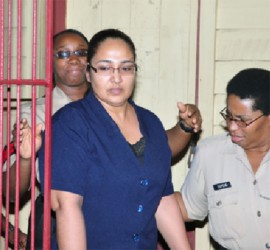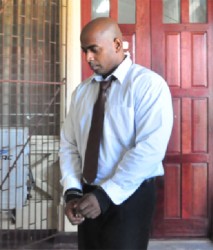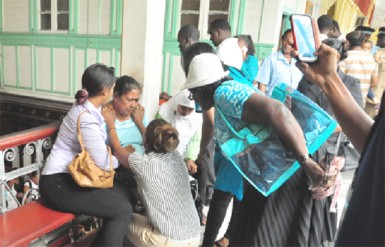Bibi Sharima-Gopaul and her former lover Jarvis Small were yesterday found guilty of the brutal murder of 16-year-old Neesa Gopaul and both received sentences that will see them spend the rest of their natural lives behind bars.
Before a crammed courtroom, Justice Navindra Singh sentenced Sharima-Gopaul, the mother of the murdered teen, to 106 years in jail, while he sentenced Small, called ‘Barry, to 96 years, following a unanimous guilty verdict by a 12-member jury at the High Court.
The verdict was returned after three hours of deliberations by the jury and it saw loud expressions of satisfaction from many in the crowded courtroom as well as hundreds who converged on the streets outside the courthouse. “Justice for Neesa,” some shouted afterward.

Sharima-Gopaul’s attorney said he intended to appeal the decision.
Sharima-Gopaul, 42, and Small, 37, were charged with killing the young girl between September 24, 2010, and October 2, 2010, at Madewini, Linden-Soesdyke Highway. The teen’s body was found stuffed into a suitcase, which was anchored in a creek at the Emerald Tower Resort with several dumbbells. Her head had been bashed in and the trial heard that 50% of it was gone when the recovered corpse was examined.
In handing down the sentences, Justice Singh said he was starting the sentence at 60 years for each of them. The judge then added 10 years because they premeditated the murder, 10 years because the victim was a child, 10 years for the brutality meted out to the girl and six years for the domestic violence she suffered.
Meanwhile, the judge told Sharima-Gopaul that she was being given an extra 10 years because Neesa was her child and she was supposed to protect her and not stand by and allow her to be murdered.
The judge told the woman he couldn’t imagine what kind of a “monster” of a mother would kill her own child. “You have lied throughout the trial about everything,” the judge told her, before adding, “I know you won’t live out the sentence, but I hope you will serve it wherever you go.”
A visibly-shaken and distressed Sharima-Gopaul could be seen gasping after learning her fate, while her composed co-defendant stood expressionless.
‘I thought I would have had justice here’

When they had been asked by the judge’s clerk whether they had anything to say as to why the court should not go ahead and pass sentence on them, they both responded in the affirmative.
In her dry-eyed sobbing address to the court, Sharima-Gopaul told Justice Singh that she thought he could have done “a little more” in her favour in his directions to the jury.
The woman said she did not lie and everything she spoke about could be verified. She said while she had been locked up, her in-laws had “a lot of things” to say about her that were in the print media.
According to Sharima-Gopaul, when she was in prison, she had spoken twice to Minister of Home Affairs Clement Rohee about the lack of evidence and she said he had told her, “I know, I know, but there is a lot more to it than that.”
The woman told Justice Singh, “I thought I would have had justice here.”
For his part, Small voiced his belief that he had not been given a fair trial before Justice Singh. “It was more like a media trial,” he contended.
Small said prejudicial material was led into evidence against him and accused Justice Singh of being unfair. Small told the judge that he was unfair “and a politician by nature.”

The convict posited that no evidence had been presented in the case to find him “or anybody guilty of murder.”
In response, Justice Singh said, “I don’t have any political ambitions, just so you’ll know.”
The defeated defence attorneys, when given a chance to speak, made brief remarks.
Attorney Glenn Hanoman, one of Small’s four lawyers, said his client is a father of three and asked the judge for a probation report for sentencing but his request was denied. Apart from Hanoman, Small’s defence team included Lyndon Amsterdam, Bernard De Santos SC, and Zanna Frank.

Meanwhile, attorney George Thomas, who represented Sharima-Gopaul, asked the court to spare his client from the hangman’s noose. He asked Justice Singh to impose a custodial sentence as opposed to a sentence of death by hanging. He also said his client was a first-time offender “who is in the process of rehabilitation.”
Thomas also gave the court oral notice of his intention to appeal the decision.
In brief remarks, successful State Prosecutor Diana Kaulesar said the evidence in the case spoke for itself and the jury had made a decision that the prosecution was standing by.
‘Justice has been served!’
Justice Singh presented his directions to the jury yesterday morning in a courtroom packed to capacity although additional benches were brought in. By the time the jury returned to deliver its verdict after lunch, however, the crowd had grown into hundreds. Some magistrates, lawyers and court staff had to stand like many other citizens who had gathered for the verdict. Persons who did not have seats, were allowed to stand in the courtroom. Some court employees were seen carrying their office chairs into the courtroom.
Countless senior and junior ranks of the police force were also among those present to provide additional security, including the Court Superintendent Desiree Fowler. Officers stood their ground to ward off the crowd from entering the courtroom in a disorderly manner before the resumption of the hearing. A police officer who later came to inform members of the press that they could enter the courtroom had to save himself from being the victim of a human stampede after everyone began racing to the door to secure a seat. Those unable to gain access to the already over-crowded courtroom stood their ground on the corridors outside as they too waited in anticipation for the verdict.
In directing the jury, Justice Singh explained how the law needed to be applied to the facts of the case. He emphasised to the jurors that they were the “judge of fact,” while he was the “judge of the law.”
He also explained the importance of applying the respective law to the facts and directed that they make that legal application strictly, irrespective of their opinions, while pointing out that the issues of fact were for their sole judgment.
Later, as the jury foreman rose to address the court, many were on the edge of their seats in anticipation, marking every second before he uttered his first word.
Once it had been heard that the accused had been found guilty, the once deafening silence of the courtroom was immediately broken by resounding “yeses” from many who were obviously satisfied with the verdict.
The marshall was eventually moved to repeatedly call for “silence in court” and he had to sound this order once more when Justice Singh began sentencing. As the judge explained his rationale for the large sentences, many “ooohs,” “ahhhs,” and “wows” could be heard.
Once the news reached the corridors outside the courtroom, there were shouts of “Justice has been served!” and “Yes Neesa deserved justice, and she has gotten it today.”
One woman, overcome with emotion, shouted, “This is justice! I am a mother with daughters and I feel it for that little girl.”
The celebratory chants were no different from the hundreds who converged outside the courthouse on South Road. “Justice for Neesa,” they shouted and danced, attracting the attention of passersby. Traffic moved slowly along South Road and Croal Street as news of the verdict spread.
But not everyone was celebrating. Small’s wife, Marcelline, broke into tears and had to be consoled by relatives and some of her husband’s attorneys. The woman wept quietly as she watched her husband exit the courtroom to be whisked away to prison.
The news had the same effect on Sharima-Gopaul’s mother, who also broke down and sobbed as her family surrounded her as she looked on while her daughter was being escorted away by police officers.
Protest
Before the verdict, several non-governmental organisations (NGOs) protested in front of the High Court for the two accused to be found guilty.
The protesters were representatives from the Guyana Responsible Parenthood Association, Help and Shelter, ChildLink and Red Thread. They stood in the midday sun, holding up placards that read: “Justice for Neesa Gopaul!”, “Justice System must work now for Neesa Gopaul”, “Who is next?” and “The justice system failed Neesa Gopaul.”
Renuka Anandjit, a representative of the Guyana Responsible Parenthood Association, stated that Gopaul’s death proved that there was a major gap in the justice system “as it relates to access for justice for young people.”
She added, “Neesa Gopaul was a sister, a daughter and a friend and we think that it is important for us to come out here and highlight her plight… she may be gone but we will never forget her.”
She stated that the NGO was following the news and had heard about the trauma the girl went through before dying. “We can only imagine what her last moments were like and we could only avoid that from occurring. Today we are really hoping that the state comes out victorious in prosecuting her murderers! We pray that other girls in her shoes would have justice.”
A representative of Help and Shelter said the case had grabbed the attention of the nation because the justice system failed Neesa. “Every system failed Neesa Gopaul until she was murdered. This is really a tragedy and a travesty of the system in Guyana. We want to use her story to get justice for other children,” she said.
One protester blamed Neesa’s family for not intervening when she made several allegations against Small and her mother. “Neesa had family who could have stepped in and intervened in this situation. This is a child who lost her life as a result of certain circumstances and we want to remind families that they have an integral role to play,” the woman said.
“It is your primary responsibility to protect your children so we would like to see justice served today. We would expect the jury to deliberate and deliver a good verdict in this case,” Omattie Madray, a representative of ChildLink, said.
Joy Marcus, a representative of Red Thread, stated that the case highlights some of the trauma other young people experience at the hands of their parents. She added that they were hoping for a fair and just decision. “We hope that the decision today would be in the best interest of all the children of Guyana so that this would not happen to another child,” she said.
The curtains came down on the case after five weeks of testimony, which saw 26 state witnesses taking the stand, including police and civilian witnesses.
Government Pathologist Dr. Nehaul Singh, who performed a post-mortem examination on teen’s body, had testified that she was missing 50% of her head and that the multiple blunt trauma that caused her death had been forcefully inflicted.
The defence attorneys had asked jurors to find their clients not guilty, while charging that there was a lack of evidence to convict the two. The lawyers had made a no-case submission, which was overruled by Justice Singh, who called upon them to lead a defence. They had no witnesses to call in their defence and both opted to give unsworn testimonies.
Small, in his defence, said he was innocent of this charge and declared that he was a family man and not a killer. “I did not kill Neesa Gopaul, nor did I play any part in killing her,” he said, adding, “I would like the police to find the real killers, and let them pay for what they did to Neesa.”
Sharima-Gopaul also said she was innocent. She said she loved her daughter and did nothing to harm her and did not allow anyone to do so. (Additional reporting by Jeanna Pearson)





